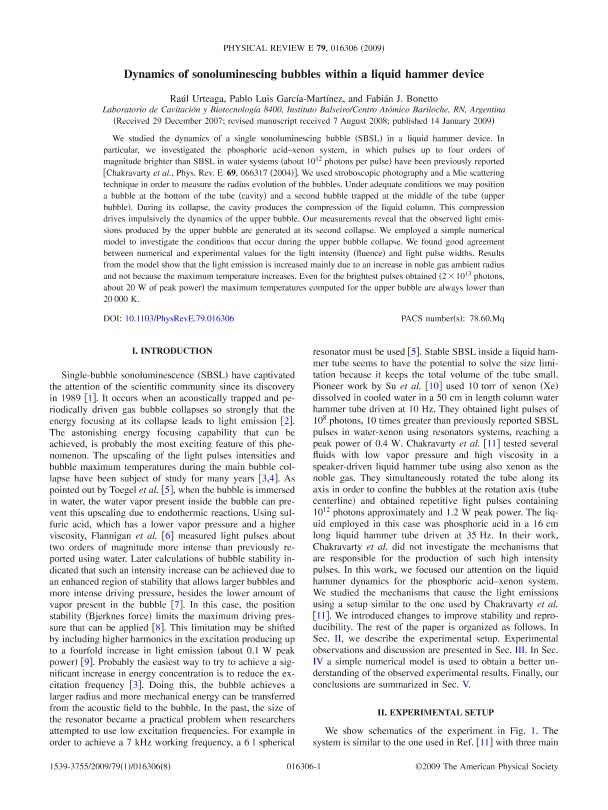Mostrar el registro sencillo del ítem
dc.contributor.author
Urteaga, Raul

dc.contributor.author
Garcia Martinez, Pablo Luis

dc.contributor.author
Bonetto, Fabian Jose

dc.date.available
2017-09-15T22:07:14Z
dc.date.issued
2009-01
dc.identifier.citation
Urteaga, Raul; Garcia Martinez, Pablo Luis; Bonetto, Fabian Jose; Dynamics of sonoluminescing bubbles within a liquid hammer device; American Physical Society; Physical Review E: Statistical Physics, Plasmas, Fluids and Related Interdisciplinary Topics; 79; 1; 1-2009; 1-8; 016306
dc.identifier.issn
1063-651X
dc.identifier.uri
http://hdl.handle.net/11336/24446
dc.description.abstract
We studied the dynamics of a single sonoluminescing bubble (SBSL) in a liquid hammer device. In particular, we investigated the phosphoric acid–xenon system, in which pulses up to four orders of magnitude brighter than SBSL in water systems (about 1012 photons per pulse)have been previously reported [Chakravarty et al., Phys. Rev. E 69, 066317 (2004)]. We used stroboscopic photography and a Mie scattering technique in order to measure the radius evolution of the bubbles. Under adequate conditions we may position a bubble at the bottom of the tube (cavity) and a second bubble trapped at the middle of the tube (upper bubble). During its collapse, the cavity produces the compression of the liquid column. This compression drives impulsively the dynamics of the upper bubble. Our measurements reveal that the observed light emissions produced by the upper bubble are generated at its second collapse. We employed a simple numerical model to investigate the conditions that occur during the upper bubble collapse. We found good agreement between numerical and experimental values for the light intensity (fluence) and light pulse widths. Results from the model show that the light emission is increased mainly due to an increase in noble gas ambient radius and not because the maximum temperature increases. Even for the brightest pulses obtained (2x1013 photons, about 20 W of peak power) the maximum temperatures computed for the upper bubble are always lower than 20000 K.
dc.format
application/pdf
dc.language.iso
eng
dc.publisher
American Physical Society

dc.rights
info:eu-repo/semantics/openAccess
dc.rights.uri
https://creativecommons.org/licenses/by-nc-sa/2.5/ar/
dc.subject
Liquid
dc.subject
Hammer
dc.subject
Sonoluminescent
dc.subject
Bubble
dc.subject.classification
Otras Ciencias Físicas

dc.subject.classification
Ciencias Físicas

dc.subject.classification
CIENCIAS NATURALES Y EXACTAS

dc.title
Dynamics of sonoluminescing bubbles within a liquid hammer device
dc.type
info:eu-repo/semantics/article
dc.type
info:ar-repo/semantics/artículo
dc.type
info:eu-repo/semantics/publishedVersion
dc.date.updated
2017-09-13T16:15:56Z
dc.journal.volume
79
dc.journal.number
1
dc.journal.pagination
1-8; 016306
dc.journal.pais
Estados Unidos

dc.description.fil
Fil: Urteaga, Raul. Comision Nacional de Energia Atomica. Gerencia D/area de Energia Nuclear. Gerencia de Ingeniería Nuclear (cab). Laboratorio Cavitación y Biotecnología; Argentina. Consejo Nacional de Investigaciones Científicas y Técnicas; Argentina
dc.description.fil
Fil: Garcia Martinez, Pablo Luis. Comision Nacional de Energia Atomica. Gerencia D/area de Energia Nuclear. Gerencia de Ingeniería Nuclear (cab). Laboratorio Cavitación y Biotecnología; Argentina. Consejo Nacional de Investigaciones Científicas y Técnicas; Argentina
dc.description.fil
Fil: Bonetto, Fabian Jose. Comision Nacional de Energia Atomica. Gerencia D/area de Energia Nuclear. Gerencia de Ingeniería Nuclear (cab). Laboratorio Cavitación y Biotecnología; Argentina. Consejo Nacional de Investigaciones Científicas y Técnicas; Argentina
dc.journal.title
Physical Review E: Statistical Physics, Plasmas, Fluids and Related Interdisciplinary Topics

dc.relation.alternativeid
info:eu-repo/semantics/altIdentifier/doi/http://dx.doi.org/10.1103/PhysRevE.79.016306
dc.relation.alternativeid
info:eu-repo/semantics/altIdentifier/url/https://journals.aps.org/pre/abstract/10.1103/PhysRevE.79.016306
Archivos asociados
